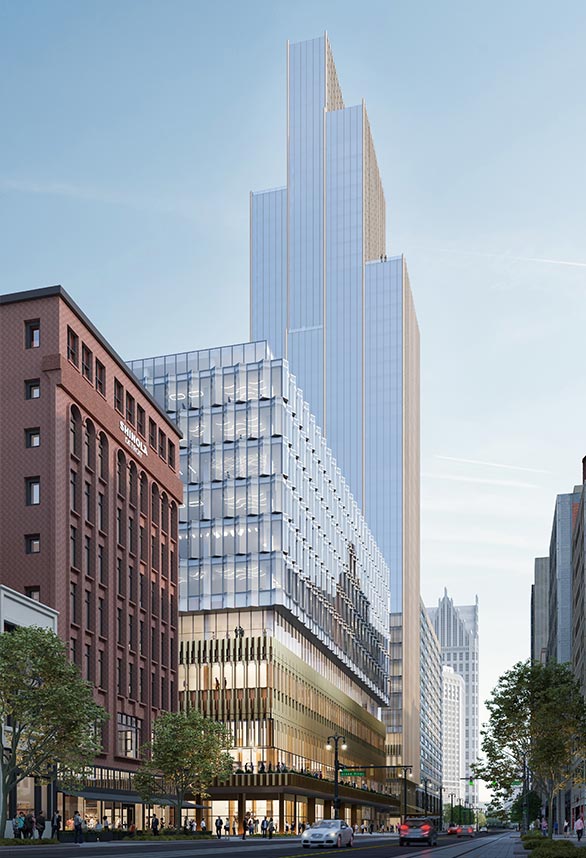Metro Detroit is experiencing a remarkable resurgence, driven by a series of ambitious revitalization projects that are transforming the region’s urban landscape – A very exciting time for Michiganders!
From the iconic Hudson’s Site in Downtown Detroit to the innovative Ford Corktown Campus, these developments are not only reshaping the city’s skyline but also creating significant opportunities for commercial real estate development. In this post, we’ll explore some of the most notable revitalization efforts and their impact on commercial construction in Metro Detroit.
The Hudson’s Site: A New Landmark in Downtown Detroit
One of the most anticipated projects in Detroit’s ongoing revitalization is the Hudson’s Site, located in the heart of downtown. Once home to the J.L. Hudson Department Store, this site is being transformed into a mixed-use development that will feature residential, office, retail, and public spaces. The project, led by Bedrock Detroit, is set to include one of the tallest buildings in the city, a testament to Detroit’s rebirth as a hub of business and culture.
- Impact on Commercial Real Estate: The Hudson’s Site development is expected to attract a wave of new businesses to downtown Detroit, offering prime office spaces and retail opportunities in a bustling urban environment. This project is likely to stimulate further commercial construction in the surrounding areas as businesses seek to capitalize on the increased foot traffic and revitalized atmosphere. The ripple effect of this development is poised to extend beyond downtown, influencing commercial real estate trends throughout the entire Metro Detroit region.
Ford Corktown Campus: Driving Innovation and Growth
Another transformative project is the Ford Motor Company’s redevelopment of the Corktown neighborhood, anchored by the restoration of the iconic Michigan Central Station. Ford’s vision for this campus is to create a mobility innovation district, fostering collaboration between automakers, tech companies, and startups. The Corktown Campus aims to become a hub for the future of transportation, with a focus on autonomous vehicles and smart city technologies.
- Impact on Commercial Real Estate: Ford’s investment in Corktown is generating a significant demand for commercial real estate, particularly in the technology and innovation sectors. The development is expected to attract a host of ancillary businesses, including research labs, co-working spaces, and retail outlets catering to the needs of employees and residents. This influx of new businesses is driving up property values and encouraging further investment in commercial construction, not only in Corktown but also in neighboring districts.
The District Detroit: A Catalyst for Urban Renewal
The District Detroit is another key player in the city’s revitalization efforts. This expansive project encompasses 50 blocks between downtown and Midtown Detroit, anchored by Little Caesars Arena, home to the Detroit Red Wings and Pistons. The District Detroit is a mixed-use development that includes residential, office, and retail spaces, as well as entertainment venues. The goal is to create a vibrant, walkable community that bridges the gap between two of Detroit’s most dynamic areas.
- Impact on Commercial Real Estate: The District Detroit has already had a profound impact on the surrounding areas, with a surge in demand for commercial spaces, particularly in the hospitality and retail sectors. The project has attracted new businesses to the area, contributing to a broader trend of urban renewal that is revitalizing Detroit’s commercial real estate market. As The District Detroit continues to expand, it is expected to serve as a model for other revitalization projects across the city, further boosting commercial construction opportunities.
Beyond the City Center: Revitalization in Metro Detroit Suburbs
While much of the attention is focused on Detroit’s urban core, several suburban areas within Metro Detroit are also experiencing significant revitalization efforts. Cities like Birmingham, Bloomfield Hills, and Troy are seeing a wave of new developments aimed at modernizing commercial corridors and attracting businesses.
In Troy, the development of the Pavilions of Troy, a mixed-use project featuring retail, office, and residential components, is a prime example of suburban revitalization. Similarly, Birmingham’s Rail District is undergoing a transformation, with new commercial and residential spaces emerging in this formerly industrial area.
- Impact on Commercial Real Estate: These suburban revitalization projects are creating new opportunities for commercial real estate development outside of Detroit’s downtown core. Developers are capitalizing on the demand for modern, mixed-use spaces in suburban settings, leading to a boom in commercial construction. As more businesses look to establish a presence in these revitalized areas, the commercial real estate market in Metro Detroit’s suburbs is poised for significant growth.
A New Era for Metro Detroit
The ongoing revitalization projects in Metro Detroit are ushering in a new era of growth and opportunity for the region’s commercial real estate market. From the towering Hudson’s Site in Downtown Detroit to the innovative Ford Corktown Campus and the expansive District Detroit, these developments are not only reshaping the city’s landscape but also creating a wealth of opportunities for businesses and investors alike.
As Metro Detroit continues to evolve, the impact of these revitalization efforts will be felt for years to come, driving further commercial construction and solidifying the region’s status as a hub of innovation and growth.
Contact us now to start your commercial construction project in Detroit!
Follow us!

